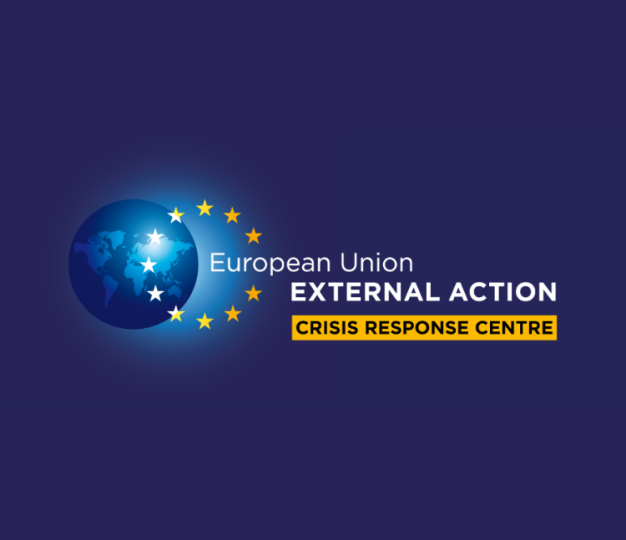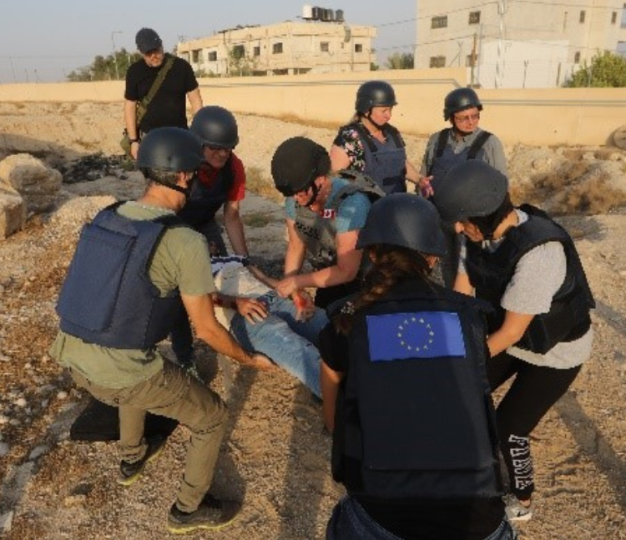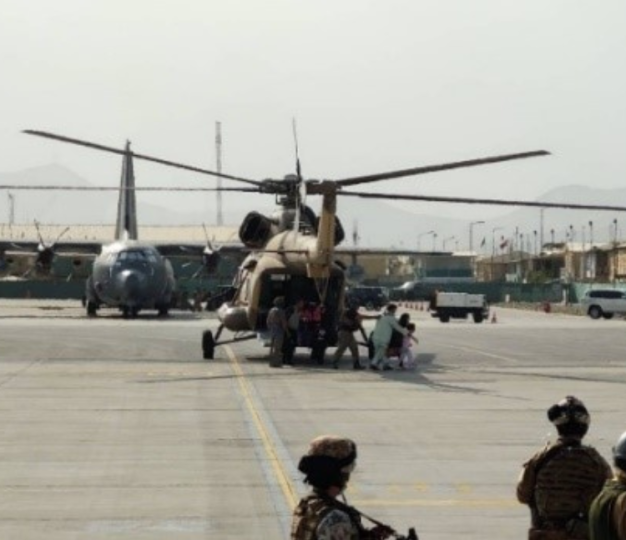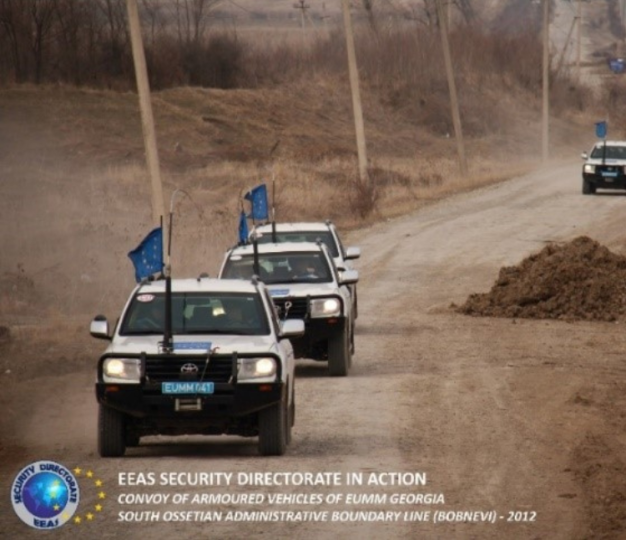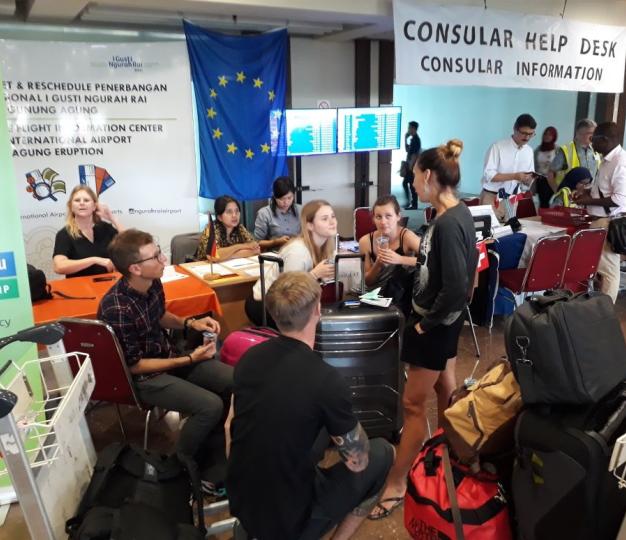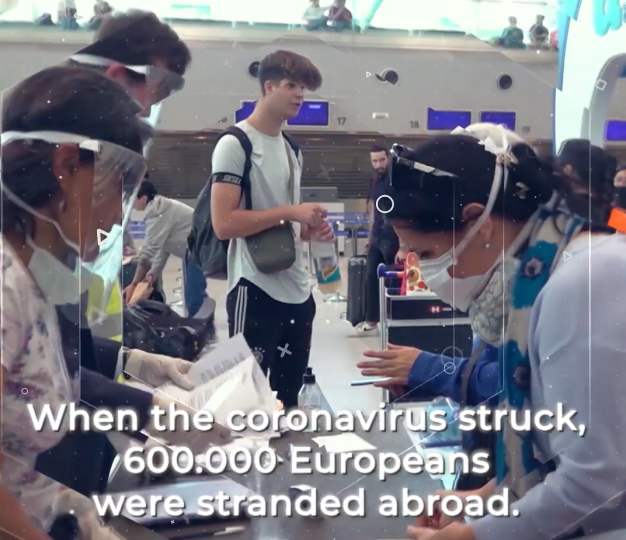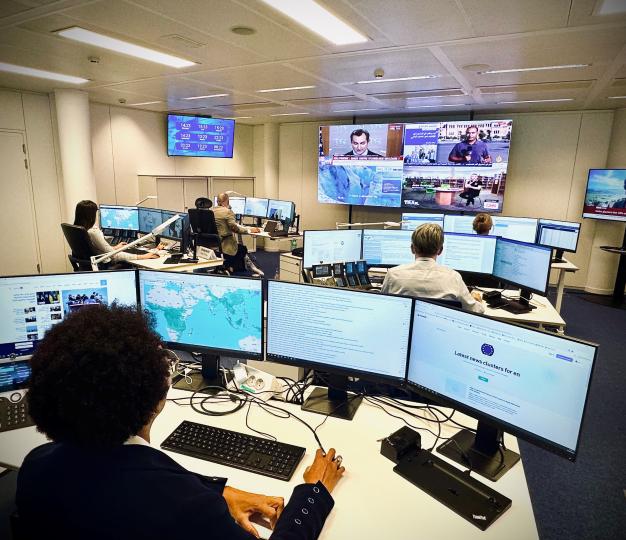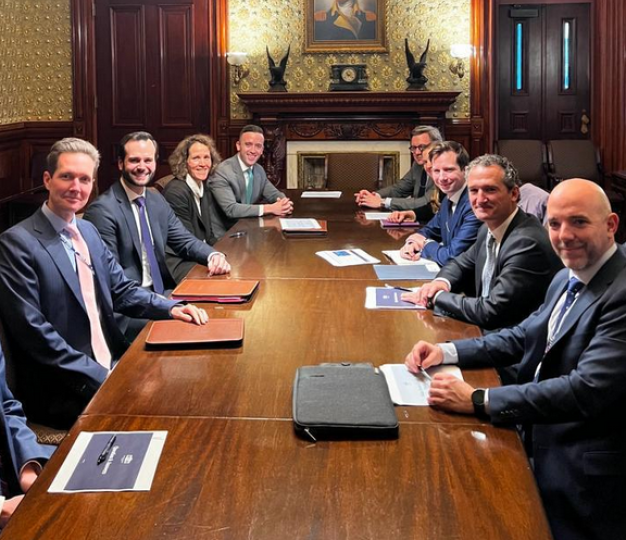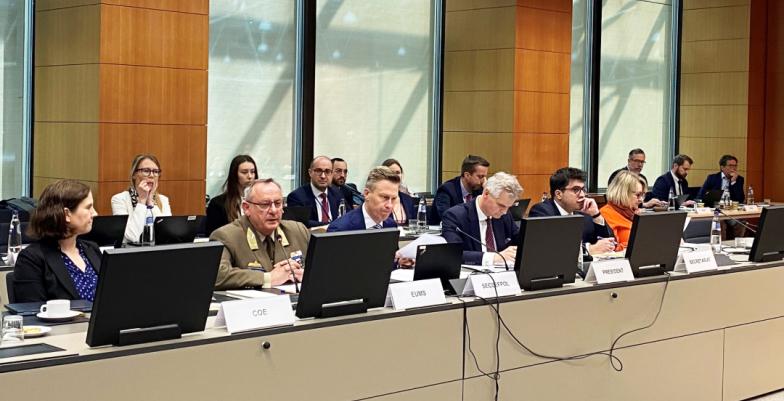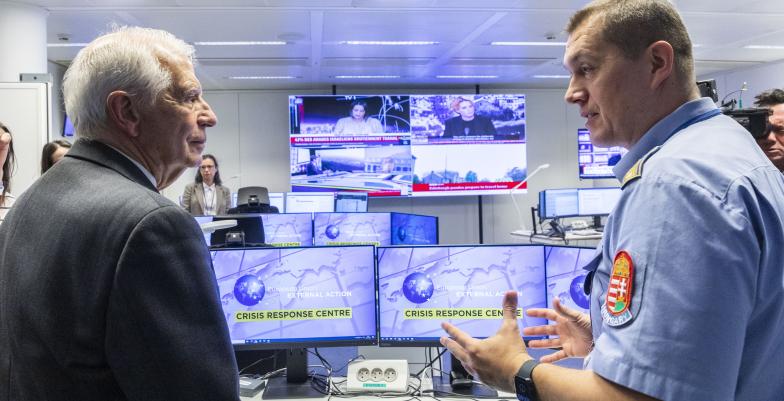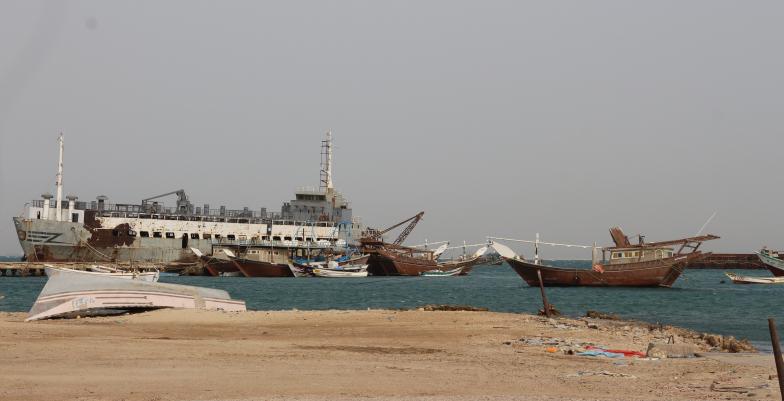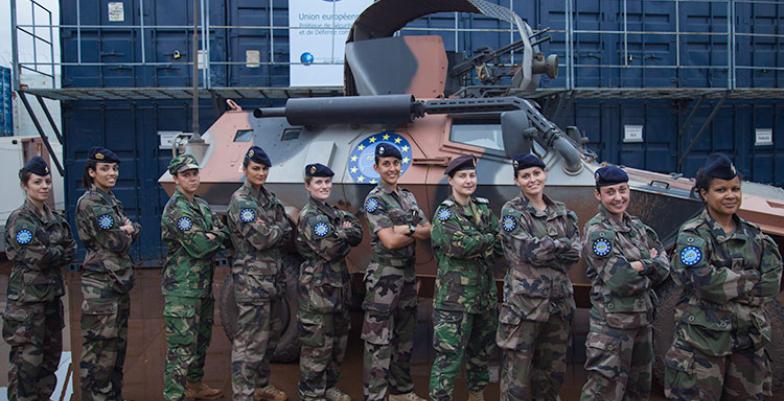Crisis Response
The COVID-19 pandemic, Russia’s war of aggression against Ukraine, and crises such as in Afghanistan and Sudan have been stark reminders of the increasingly instable global environment we live in. EU citizens, staff and interests abroad are among those impacted. To protect them, the EU committed to a stronger response to security and consular crises in the Strategic Compass.
Discover how the EEAS Crisis Response Centre contributes to this work.
EEAS Crisis Response Centre (CRC)
To strengthen the EU’s ability to respond to security and consular crises abroad, the High Representative created the EEAS Crisis Response Centre (CRC) in July 2022.
The CRC is the single entry point for all crisis-related issues in the EEAS and the 24/7 permanent crisis response capability for emergencies threatening the safety of the staff in EU Delegations, and/or in reaction to crises affecting EU citizens abroad.
It brings together security, consular and situational awareness experts, while relying on committed professionals on the ground in EU Delegations.
To ensure a coordinated and coherent EU response to crises, the Centre works in close cooperation with the European Commission (in particular DG ECHO’s Emergency Response Coordination Centre), the Council of the European Union (including in the framework of the Integrated Political Crisis Response (IPCR)), as well as with the crisis centres of EU Member States and like-minded partners.
The main objectives of the Crisis Response Centre are to:
- Keep EU staff safe in the field: We fulfil the EEAS duty of care towards its security interests in EU Delegations, including towards EU staff, premises, assets and information.
- Facilitate the consular protection of EU citizens: We ensure EU consular coordination and support Member States in providing consular protection to EU citizens during crises, particularly those whose country has no diplomatic representation locally.
- Provide 24/7 global situational awareness: We enable informed decision-making on crisis preparedness and response by providing 24/7 global early warning and situational awareness. We also serve as an information hub when crises hit.
- Coordinate EU crisis response: We foster better crisis response by ensuring coordination within the EEAS and EU institutions, as well as with Member States and partners.
- Be prepared to respond to crises: We ensure that both the EEAS Headquarters and EU Delegations around the world are prepared to respond to crises through contingency planning, training and exercises.
- Ensure the business continuity of EU Delegations during crises: We take all the necessary measures to enable EU Delegations to safely fulfil their essential mission during crises. This includes evacuating staff or deploying additional support where necessary.
Keeping EU staff, premises, assets and information safe in the field
Imagine you work for the European Union in one of its EU Delegations across the world. The Vienna Convention provides that the host country is responsible for the security of foreign diplomatic missions and staff in the country, including you. In parallel, these security provisions are always complemented by security measures from your sending organisation. This is where the Crisis Response Centre (CRC) steps in.
The CRC supports the operations of EU Delegations by ensuring they work in the most secure environment possible. Threats against EU Delegations and staff vary as wide as from natural hazards to deliberate attacks. The CRC enables the work of the EU Delegations worldwide by providing security advice and support, and assisting the EEAS on the fulfilment of the legal duty of care obligation towards the EEAS staff and eligible dependents, assets and information. The CRC does so by providing security assessments, assets and organising trainings and exercises. Through these means, the right measures are put in place to reduce risks. Continuous investment in security and crisis preparedness is needed for the security of staff as proven recently during crises affecting Kabul (2021), Kyiv (2022) and Khartoum (2023).
A comprehensive Security Risk Management methodology is applied in the day-to-day work, incorporating case-by-case assessments and ad-hoc operations. Thanks to this methodology, well-founded decisions targeted to the local context in terms of security are taken.
The Crisis Response Centre relies on dedicated professional teams in Brussels and the Regional Security Officers deployed in EU Delegations. Close contact is maintained with diplomatic security counterparts in EU Member States and with like-minded countries and international organisations.
Facilitating the Consular Protection of EU Citizens
Natural disasters, transport accidents, armed conflicts… Some of the millions of EU citizens living or travelling abroad can face very difficult situations. These situations become “consular crises” when the life, health or security of many of them is at risk – for example when more than 1,700 EU citizens were stranded in Sudan when the conflict erupted there in the spring of 2023.
During such crises, the EEAS facilitates the consular protection of EU citizens by supporting coordination and cooperation among EU Member States, whose diplomatic and consular services assist EU citizens directly. While not every EU Member State has diplomatic representation in every country of the world, EU citizens can get consular assistance from another EU Member State in the country where they face a crisis, if theirs is not present.
To facilitate the consular protection of EU citizens, before, during and after crises, the Crisis Response Centre (CRC) works closely with EU Member States at capital-level, including as part of the Council Working Party on Consular Affairs (COCON), and locally through the network of EU Delegations.
For example, the CRC facilitates the development of joint EU consular crisis contingency plans for every non-EU country. It also organises or participates in local consular exercises based on fictitious crisis scenarios to test those plans. The consular exercise organized in Ukraine, shortly before Russia’s war of aggression began, was instrumental in testing consular crisis preparedness and facilitated the evacuation of EU citizens later on.
The Centre also supports information exchange between EU Member States, including through the dedicated consular online platform it manages. During the Sudan crisis, the coordination role played by the EEAS was instrumental in assessing the situation of EU citizens in the country and finding evacuation options for them.
Enabling informed Crisis Preparedness and Response
Preparing for and responding to crises require accurate and timely information – this is where the EU Situation Room comes into play.
As part of the Crisis Response Centre (CRC), the EU Situation Room acts as an information hub. Working 24/7, all year round, it provides global, comprehensive early warning and timely situational awareness and horizon scanning to all the actors involved in crisis preparedness and response.
During crises, it brings together all available information sources, including publicly available sources, social media, operational information, situational information and analysis received from the relevant services of the EEAS, the EU Delegations, as well as CSDP Missions and Operations.
The information provided by the EU Situation Room helps the EU to anticipate emergencies, while being better equipped to respond to crises affecting EU staff and citizens.
Ensuring a Coordinated Response to Crisis
Coordination is a crucial part of crisis response, and the Crisis Response Centre (CRC) plays an important role in fostering cooperation within the EU and with partners.
When a crisis hits, the CRC activates the EEAS Crisis Response Mechanism to bring together all relevant colleagues from across EU institutions and services - be they working on security, consular, military, political, administrative, intelligence or communication matters.
The CRC also closely cooperates with the European Commission (in particular DG ECHO’s Emergency Response Coordination Centre), the Council of the European Union (including in the framework of the Integrated Political Crisis Response (IPCR)), as well as with the crisis centres of EU Member States.
Cooperating with international partners makes a difference when managing crises. That is why the CRC works closely with like-minded countries and organisations. For example, the CRC holds regular exchanges on security or consular matters with Australia, Canada, New Zealand, United Kingdom, the United States, and with UN partners.
The Crisis Response Centre in Numbers
24/7: The Crisis Response Centre (CRC) operates at all times, all year round.
70+: Regional Security Advisers and Officers, who advise and assist the Heads of EU Delegations in arranging and implementing all physical, organisational and procedural measures related to the security of the Union's Delegations.
300+: Number of colleagues in EU Delegations – one "Consular Correspondent" and one back-up in each bilateral EU Delegation to a non-EU country - working to facilitate local EU consular cooperation as part of their tasks.
200+: Number of crisis reports produced by the EU Situation Room over the past year.
250+: Number of situational maps produced by the EU Situation Room over the past year.

